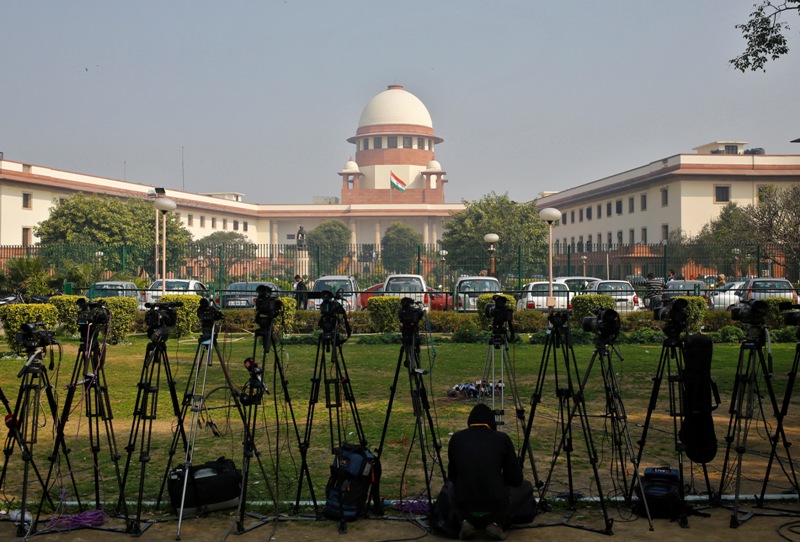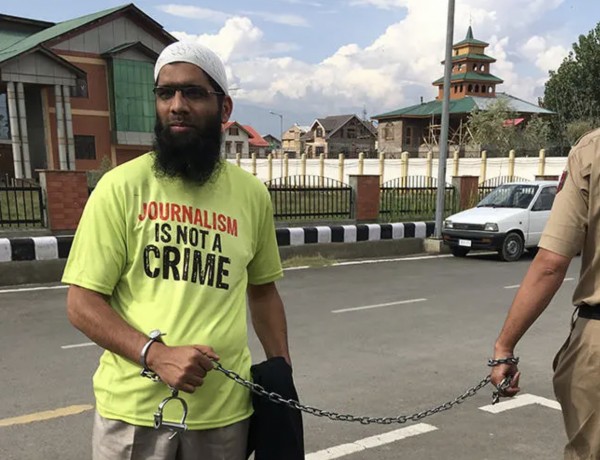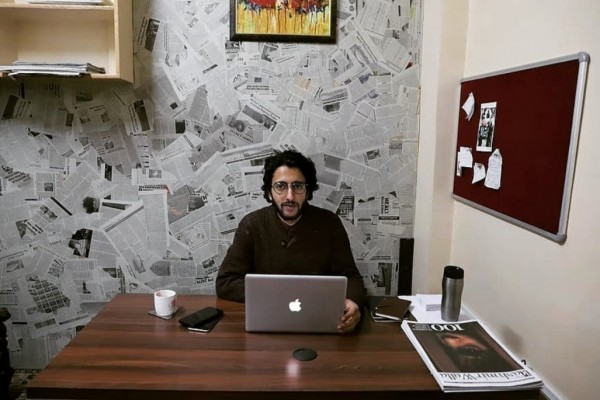Hopes that India’s Supreme Court would strike down laws criminalising defamation were dashed last month when the Court, upholding the laws, opined: “‘Reputation’ of one cannot be allowed to be crucified at the altar of the other’s right of free speech.”
Rejecting claims that criminal defamation laws damage free speech, the Court refused to recognise the laws’ potential impact, saying that “it is extremely difficult to subscribe to the view that criminal defamation has a chilling effect on the freedom of speech and expression”.
But in the opinion of many Indian journalists, that conclusion flies in the face of both experience and common sense.
On May 13, a two-judge panel examining the case of Subramanian Swamy v. Union of India and Others upheld India’s criminal defamation laws as a constitutionally reasonable restriction on free speech. The challenge was brought by a number of politicians, journalists and others currently facing criminal defamation charges as a result of their criticism of various government officials.
Notable petitioners challenging the laws as a threat to free speech included Indian National Congress party Vice-President Rahul Gandhi, Delhi Chief Minister Arvind Kejriwal and Bharatiya Janata Party (BJP) leader Subramanian Swamy.
Defamation is both a civil and criminal offence in India. A sentence of simple imprisonment for up to two years or a fine – or both – are the penalties for a criminal charge. Defamation is also one of eight permissible restrictions on free speech set forth in the Indian Constitution.
The Court, in its May decision, determined that the Constitution’s framers must have meant for this exception to include criminal defamation, as it was the only recognised form of defamation at the time the Constitution was written.
The judges further noted that Art. 21 of the Constitution, which guarantees the right to life and liberty, also identifies the right to reputation as an inextricable part of a person’s dignity. Reasoning that criminalising defamation was necessary for the protection of this right, the court determined that criminal defamation was therefore a constitutionally reasonable restriction on free speech.
‘Pernicious to democracy’
Sanjay Hegde, senior advocate and counsel for two petitioners, journalists Rajdeep Sardesai and Nakkeeran Gopal, disagrees. In a telephone interview with the International Press Institute (IPI), he described criminal defamation as “pernicious to democracy and free speech”.
Nevertheless, he said the outcome did not surprise him, even though he had been optimistic that the case could lead to change. Secs. 499 and 500 of the Indian Penal Code (IPC) which proscribe and enumerate punishment for criminal defamation were written in 1860, more than 80 years before India gained independence and drafted a Constitution.
“We were hopeful that given the passage of time that this certain section could be struck down, but those hopes have not been conserved,” Hegde commented.
Narasimhan Ravi, the chair of IPI’s India National Committee and a member of IPI’s Executive Board was similarly critical.
“I think the Court has failed and it is a great disappointment,” he said. “In this modern day and age criminal defamation is virtually out of the reckoning in terms of international law.”
According to Ravi, a conviction for criminal defamation is rare, as a lengthy legal process tires many plaintiffs who drop charges before adjudication. However, while a case is pending, the defendant must physically appear in court at least once, if not many times.
“It has a chilling effect because you are dragged before the criminal court all over the country and it violates all international norms of freedom of expression,” Ravi said.
But the Supreme Court justices said that criminal defamation is a necessity partly because monetary compensation cannot adequately provide for a damaged reputation. In addition, the time it takes to adjudicate a case lessens this compensation for the injured party.
Court proceedings are prolonged affairs in India regardless of the offence. Cases often go months after filing before initial hearings and can take years before a decision is made.
Hegde agreed that even though the majority of criminal defamation suits are dropped, “the entire process itself becomes the punishment”.
Challenged as ‘unreasonable’
In arguments to the Supreme Court, counsel for the petitioners argued that criminal defamation has no purpose as it does nothing but cause “unreasonable restriction in individual freedom and further progressively mars voice of criticism and dissent which are necessitous for the growth of genuine advancement and a matured democracy”.
But the judges countered that defamation is a matter of public interest and therefore cannot be perceived as solely an individual interest. They wrote that “public wrong affects not only the victim but injures the public and ultimately concerns the polity as a whole and tested on that count, criminalization of defamation or damage to reputation is meant to subserve basic harmony in polity”.
Ravi, siding with the petitioners, rejected that idea.
“In a dispute between two parties, you do not need the power and might of the State on one side,” he said. “There are two reasons for filing a criminal defamation suit: you want to get back at someone or you want to show the public that you are not taking this lying down.”
Civil defamation laws exert far less of a chilling effect on free speech because the state is not involved in the argument. The participation of the state on one side of a dispute between individuals does little to further the public good that the Court claimed criminal defamation maintains; instead that reinforcement only aids the side that the state takes.
With criminal defamation laws, critics become criminals and those who wish to participate in the public debate of ideas that characterises democracy face a heightened risk.
As a journalist, Ravi has personally dealt with criminal defamation. At one time he faced 20 cases brought against him by the state of Tamil Nadu. The charges were dropped before the case could reach the Indian Supreme Court.
In civil defamation cases, one must prove that a statement about a public official was made with malice to be defamatory. But in criminal defamation cases, not even the truth is a total defence; one must also prove that the statement was made for the “public good”.
Moreover, in addition to differing standards of defence, in criminal defamation cases the state can bring a case on behalf of government officials. The differing standards for defences, coupled with the intervention of the state, causes members of the media to worry that criminal defamation reduces healthy criticism of government officials, which in turn harms democracy.
“Far from making public officials accountable, they are given a special status,” Ravi said.
As several critics of the Court’s decision have pointed out, this aspect of India’s criminal defamation laws violates international human rights standards. However, the Court did not acknowledge this violation, instead focusing on the fact that criminal defamation complied with Art. 12 of the Universal Declaration of Human Rights, which protects reputation and honour.
Little actual justice
While decisions in cases of criminal defamation are rare, little evidence of actual justice can be found in the filing of such cases.
“Criminal defamation is often resorted to by either political or corporate interests,” Hegde noted. Such cases often appear to be utilised to suppress disparagement of corporate and political ideas. The process is also easily abused by those seeking revenge on critics.
But the Supreme Court said that even if laws of criminal defamation are being misused, that does not warrant their repeal, as they still serve an important function in society.
That argument carries little water with Hegde, who observed: “These are laws that are regularly used to stifle the individual voice in favour of collective peace.”
The attorney highlighted not only the general threat that criminal defamation laws pose to citizens, but their particular threat to freedom of the press. The rate at which criminal defamation suits are filed by governments varies between states. In Tamil Nadu, the state government filed almost 200 charges of criminal defamation between 2011 and 2016, one of the highest levels in India.
“It’s not just the journalist who speaks that gets in trouble but the editor and the publisher,” Hegde said. “Suits are filed against the whole establishment.”
In its opinion, the Court said that people have a duty to respect each other’s dignity and that part of this is not speaking ill of one another. Speaking about the concept of fraternity as stated in the preamble to India’s Constitution and how critical the promotion of unity is to the integrity of a nation, the Court maintained that criminalising defamation was imperative for nurturing that solidarity.
However, the judges failed to take into account the experience of countries such as the United Kingdom and Sri Lanka that repealed laws criminalising defamation without harm to citizens. As systems to address defamation in the civil sphere have developed, criminal laws that formerly had legitimate purpose have become unreasonable and harmful in the perspectives of many.
Cost of stability
India’s attorney general, Mukul Rohatgi, defending criminal defamation laws, said that they were necessary because the “right to free speech does not mean right to offend”. And in India, criminal defamation laws are not the only restrictions placed upon what you can say. Laws regulating counter-terrorism, sedition, hurting religious sentiment and maintaining public tranquillity have been used to preserve social stability. But that has come at a cost to freedom of speech.
“We are not fully accustomed to speaking our own mind,” Hegde said. “Somewhere that kind of thinking has seeped into the law – that there are some things that you just cannot say.”
While media members continue to criticise criminal defamation provisions and argue that they cause free speech to suffer, there is not a large movement to remove them. After more than 150 years of living with criminal defamation laws, the Indian media has seemingly accepted that as part of the trade.
“We seem to have elevated the right to not be offended to a level higher than the right to free speech,” Hegde said. “As a country, the people of India seem to be comfortable with this.”
Ravi noted that when criminal defamation provisions are removed the press will be much freer and journalists can suspend the practice of constantly looking over their shoulders in fear of someone filing suit. But while many journalists in India may not overly worry about criminal defamation cases – as they usually end in a published retraction or apology rather than prison time – that constitutes neither an acceptable nor dependable protection for freedom of speech and expression.
“All in all these laws provide for an architecture where expression gets stifled,” Hegde said.
Despite citizens’ general complacency of citizens toward criminal defamation, the attorney says he believes that India sustains a relatively free press and society and that he remains confident that efforts to repeal the law will continue. But it will take time.
“I anticipate that there will be lobbying and fresh petitions to get the Court to rehear this petition,” he said. “But, I do not think that the fight will be easy or that it will be reversed soon.”



